by Lisa Cooke | Jul 29, 2013 | 01 What's New, Conferences, DNA, Inspiration, NARA
 Hello from Genealogy Gems Contributing Editor Sunny McClellan Morton. I’m still flying high after a week just spent at GRIP, the Genealogical Research Institute of Pittsburgh. This was like mini-graduate school for genealogists, complete with a lush green campus in the rolling hills of Pennsylvania; immediate access to legendary instructors; rigorous coursework that’s exactly what I want to learn; a great genealogy bookstore; and plenty of after-hours socializing.
Hello from Genealogy Gems Contributing Editor Sunny McClellan Morton. I’m still flying high after a week just spent at GRIP, the Genealogical Research Institute of Pittsburgh. This was like mini-graduate school for genealogists, complete with a lush green campus in the rolling hills of Pennsylvania; immediate access to legendary instructors; rigorous coursework that’s exactly what I want to learn; a great genealogy bookstore; and plenty of after-hours socializing.
While I was there, GRIP announced an exciting lineup for 2014 (it’s not even on their website yet). Here are the topics and instructors:
- Finding and Documenting African-American Families with J. Mark Lowe, CG, and Deborah Abbott, PhD.
- Practical Genetic Genealogy with Debbie Parker Wayne, CG, CGL, CeCe Moore and Blaine Bettinger, PhD, JD.
- Law School for Genealogists with Judy G. Russell, JD, CG, CGL and Richard G. “Rick” Sayre, CG, CGL.
- Becoming an Online Expert: Mastering Search Engines and Digital Archives with D. Joshua Taylor, MA, MLS.
- Determining Kinship Reliably with the Genealogical Proof Standard with Thomas W. Jones, PhD.
- Intermediate Genealogy: Tools for Digging Deeper with Paula Stuart-Warren, CG, FMGS, FUGA.
All those initials after these instructors’ names means tons of expertise is poured into every GRIP experience, and if you know any of these folks you know there’s not a “boring professor” among them!
If you’re ready for seriously advanced genealogy education, check out GRIP or other learning experiences like it. In the United States, I know about SLIG in Salt Lake City, IGHR at Samford University in Birmingham, and NIGR at the National Archives. There are also more flexible (but still demanding) options like ProGen Study Groups, Boston University’s Genealogical Research Programs and the National Genealogical Society’s American Genealogy Home Study course.
Don’t forget to check out programs and conferences offered by your own state, regional and local genealogical societies. They usually offer a variety of topics for beginners to more advanced students–and they’ll be closer to home and less expensive. Our own Genealogy Gems premium memberships offers a fabulous genealogy education for a fabulous price: in addition to premium podcast episodes, you also get a new, full-length video tutorial every MONTH to watch whenever you like, along with unlimited access to all previous full-length video tutorials. Check out our list of Premium Videos here.
by Lisa Cooke | Sep 24, 2014 | 01 What's New, Digital Archives, Listeners & Readers, Maps, Norwegian
Recently we heard from Gordon in Billings, Montana, U.S.A, who passed on news about historical Norwegian maps online now at their National Map  Works. He says:
Works. He says:
“I have been enjoying your podcasts for a couple of years now, so I though I would pass on a piece of information that some of your listeners might want to hear about.
I don’t know how many of them do research in Norway like I do but I suspect that most of the ones that do, do not make a habit of reading the Norwegian newspapers. Since my wife was born in Norway, we do read her hometown paper on a regular basis. Just yesterday, that paper, Bergens Tidende, had an article reporting that the “Statens Kartverk” (the National Map Works) has recently digitized and posted on-line 8000 historical maps of Norway. (Click here for the article.)
Unfortunately, the website for the maps has not put a link in their English section yet, but there isn’t much to read beyond place names on the maps anyway. You can view the maps here.
Just choose a county, click the green button, and see a wonderful collection of maps for anyone with ancestors from Norway.”
Thanks for the tip, Gordon! I’ll add this tip of my own: Open the website in Chrome and Chrome will automatically offer to translate the website. Simply click the Translate button, like you’ll see below:
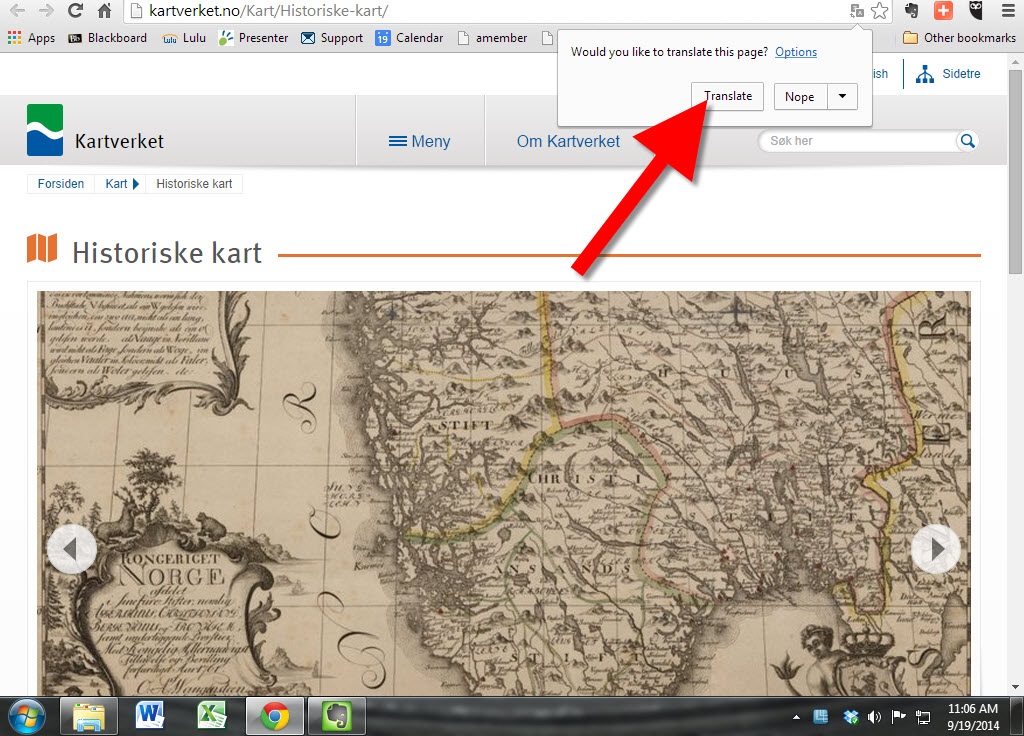
by Lisa Cooke | Jul 9, 2016 | 01 What's New, Records & databases, Research Skills |

Records that have been created recently are difficult to find and access. Some privacy laws protect, and hinder, our being able to find more recent birth, marriage, and death records we need. Here are some tips for finding these and other genealogy records not yet online.
Recently, Tom in Olympia, Washington wrote us with a question about how to find recent genealogy records that are not online yet.
“My wife’s mother was adopted in 1925. We have found her biological mother’s name and through Ancestry.com, I’ve found several bits of information about her from census records. She also was a crew member on three steamships in the 1930s. On two of the ship manifests, her U.S. passport numbers are listed. Do you know any search options for finding information from passports in the 1930s?”
Maybe you have had a similar question. We hope our answer helps everyone more easily find genealogical records that are not online yet.
Obtaining Recent Passport Application Records
Tom will be interested in obtaining a passport application record which may hold more information about his targeted ancestor. As Tom already discovered, U.S. passport records are online at Ancestry and FamilySearch, but only those records prior to 1925.
My original hope was that the National Archives Records Administration would have had the passport application records for the 1930s. I googled passport applications National Archives, and the first search result took me to an excellent article. I learned the U.S. State Department has passport applications on microfilm between the years and dates of 1795 to 1905 and January 2, 1906 – March 31, 1925. Sadly, these were not the years Tom was looking for.
To find information about passport applications in the 1930s, I needed to go another route. I opened a new window and googled U.S. State Department passport applications request copy. The first search result took me right to the page I needed. The Passport Services maintain the U.S. passport records from 1925 to the present. These records are protected by the Privacy Act of 1974.
Passport records in this time frame for a third-party person are processed under the Freedom of Information Act. These records need to ordered by mail. Tom can make a request in writing and send that request to:
U.S. Department of State
Office of Law Enforcement Liaison
FOIA Officer
44132 Mercure Cir
P.O. Box 1227
Sterling, VA 20166
I suggested he mention his desire for the information is for genealogical purposes and what his relationship is to the person in question.
Using the Same Strategy for Other Recent Genealogy Records
Remember, this same kind of strategy applies to other genealogical records you might be looking for that were created recently. You can use Google searches and follow-up phone to find out where more recent records are and the access policies.
As an example, a recent Indiana marriage license index can be searched and viewed online for free at the Public Access records website for the state. I found this little goody by googling Indiana marriage records.
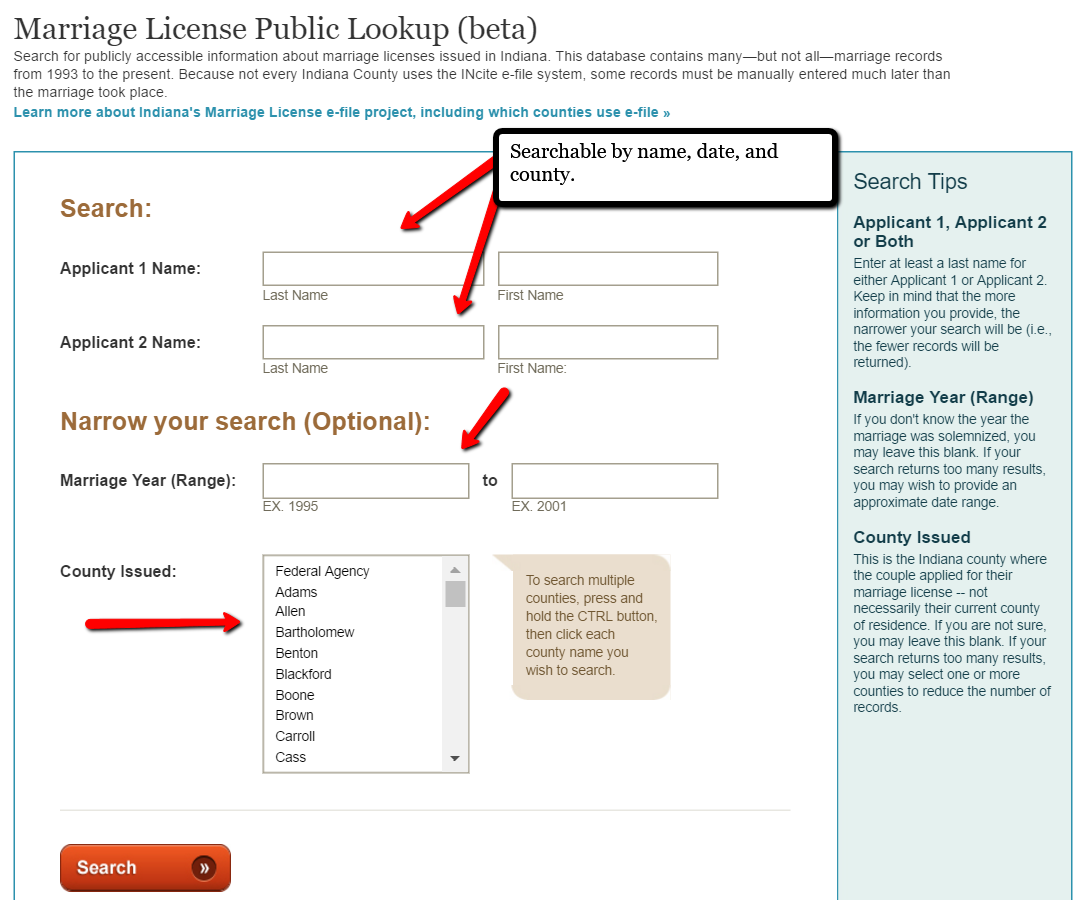
All of us at Genealogy Gems adore having the opportunity to find and share solutions like this one for overcoming the problem of locating recent genealogy records that aren’t online. If you haven’t done so already, sign-up for our weekly newsletter for more tips and tricks. Oh, and write to us anytime with your genealogy questions! We love to hear from you!
More Gems on Recent Genealogy Records

Other recent genealogy records in the U.S. are also available via the provisions of the Freedom of Information Act (FOIA). Click here to read about them! They include post-World War II draft registrations, immigration and naturalization documents and Social Security applications (SS-5).
by Lisa Cooke | Feb 10, 2017 | 01 What's New, Records & databases
Emigration records, not immigration records, are the key topic of this week’s new and updated genealogical collections. Findmypast offers several new collections regarding early British emigration. Also this week, record collections for Australian census substitutes and United States newspapers.
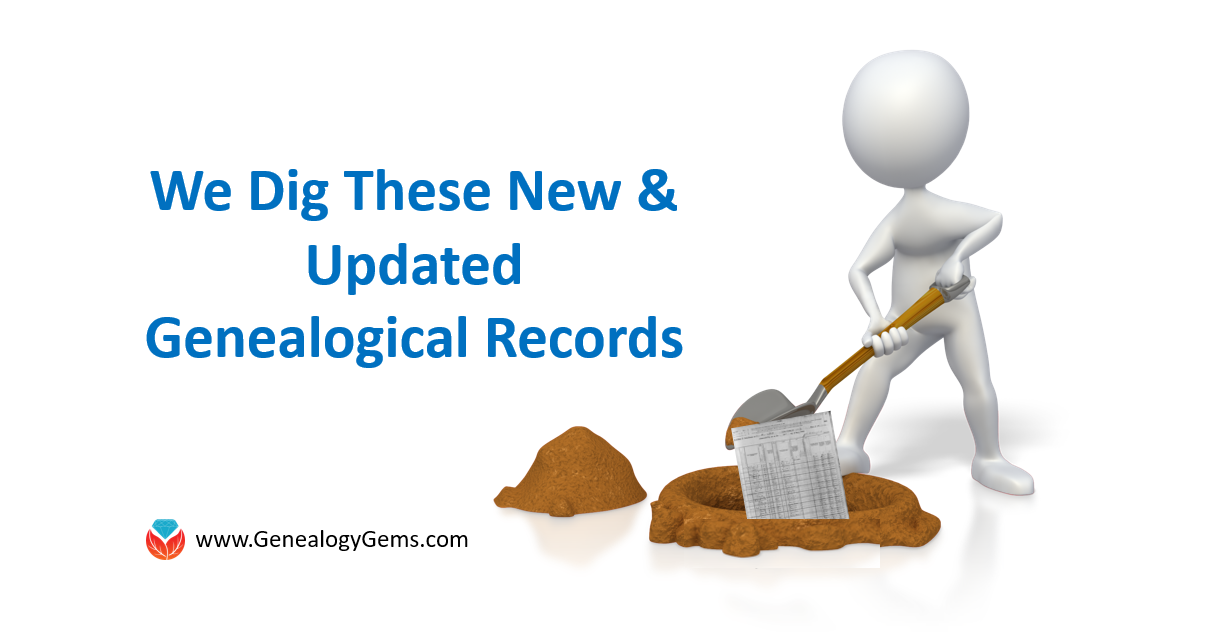
Britain – Emigration Records – Leaving from Britain
Early emigration from Britain 1636-1815 is a collection from Findmypast containing over 21,000 records that allow you to learn if your ancestors left Britain for North America or the West Indies. The collection includes 10 pieces from The National Archives including colonial papers, general entry books, passenger registers, and weekly immigration returns.
Each record includes both an image and a transcript of the original source material. Transcripts may include occupation, year of birth, the year they departed, their destination, and the ship they sailed on. Depending on the type of document, images of the original records may include additional details such as marital status, former residence, and nationality of settler.
Britain – Emigration Records to Barbados
Britain, early emigration to Barbados is another collection from Findmypast, centering on your British ancestors who left for a settlement in Barbados between 1678 and 1715. With over 20,000 assorted documents, this collection includs baptisms, burials, censuses, landowner lists, and more.
Each result provides you with a transcript and image of the original record. Transcripts may contain name, birth year, age, and parish as well as the nature of the event that was being recorded and the date. Depending on the type of document, images of the original records may also include additional details such as fathers’ names or information pertaining to other North American colonies such as the colonies of Rhode Island and Connecticut.
Britain – The Royal African Company Records
Britain, Royal African Company, 1694-1743 is a collection of over 55,000 records to uncover the details of those on board the Royal African Company’s ships to and from Africa as well as the names of those who lived and died at company forts. These Findmypast records came from The National Archives T 70 series, Company of Royal Adventurers of England Trading with Africa and Successors.
The Royal African Company was a mercantile company from 1660 until it was dissolved in 1750. It was first incorporated as the Company of Royal Adventurers Trading to Africa before being reconstituted in 1672 as the Royal African Company of England. You may find the name of one of your British soldiers who traveled with the company among these records.
Australia – Census Substitutes
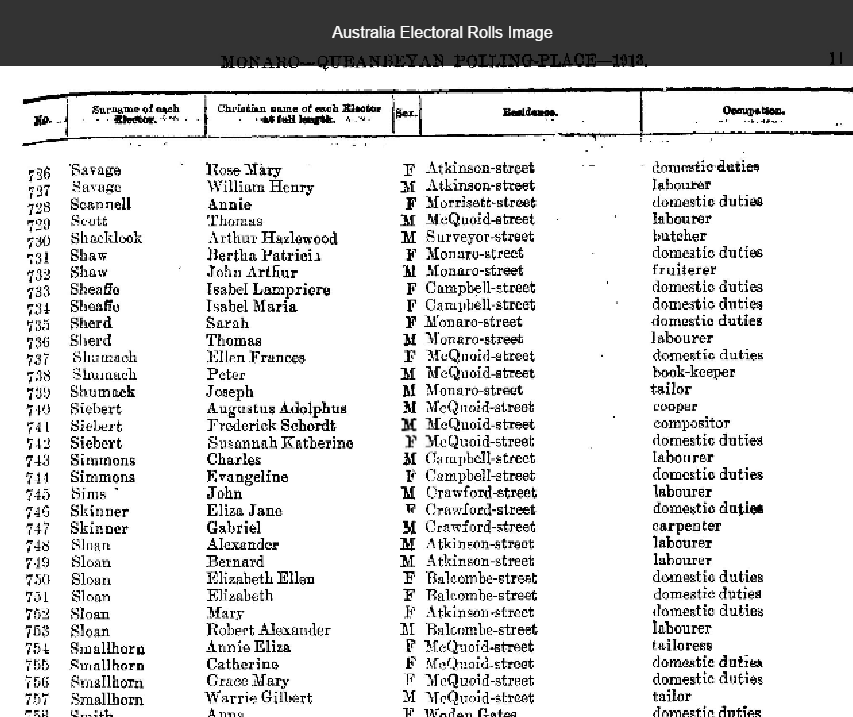 Over 1 million new records have been added to the Findmypast collection of Australia Electoral Rolls. The new additions cover Queensland and Tasmania. Electoral rolls are lists of names of those eligible to vote and can be used as a census substitute.
Over 1 million new records have been added to the Findmypast collection of Australia Electoral Rolls. The new additions cover Queensland and Tasmania. Electoral rolls are lists of names of those eligible to vote and can be used as a census substitute.
Previously, the Rolls existed as simple PDF searches that could only be accessed separately, state by state. Now, they are fully transcribed and placed into one central collection. This makes searching for your Australian ancestors easier and now you can search across all 12.6 million of these census substitutes at once. The entire collection covers New South Wales, Queensland, South Australia, Tasmania, the Northern Territory, and Western Australia and spans the years 1860 to 1959.
United States – Wisconsin – Newspapers
The University of Wisconsin-Milwaukee has digitized their entire collection of the student newspaper, The Post, to mark the 60th anniversary of the paper’s founding. These newspapers cover 55 years and are exclusively online at UWM website.
The newspapers can be searched by decade, name or keyword, and date. Some of the stories are fun and lighthearted like the Sept. 26, 1956, story on the “coed” who was crowned “Alice in Dairyland” after earlier being voted a “datable doll” at a campus carnival. Other stories include a 1975 article dealing with campus safety and parking. Lastly, you will also find more politically charged articles dealing with marijuana use and legalized abortion.
More on Emigration Records
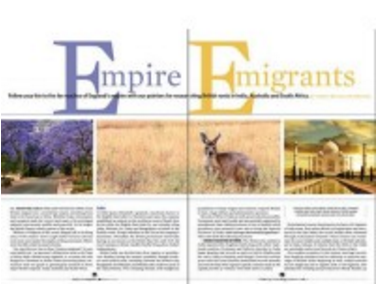 Our own Sunny McClellan Morton has just what you need to learn more on researching your ancestors’ emigration travels. The English Genealogy Guide: Researching Emigrants to Australia, India and South Africa is available from Family Tree Magazine as a downloadable PDF. And, read our blog post titled Emigration Records With an E: When Your Ancestors Left the Country, by Lisa Louise Cooke. You will be amazed at how much there is to learn about emigration…with an “E”!
Our own Sunny McClellan Morton has just what you need to learn more on researching your ancestors’ emigration travels. The English Genealogy Guide: Researching Emigrants to Australia, India and South Africa is available from Family Tree Magazine as a downloadable PDF. And, read our blog post titled Emigration Records With an E: When Your Ancestors Left the Country, by Lisa Louise Cooke. You will be amazed at how much there is to learn about emigration…with an “E”!
by michaelstrauss | Mar 19, 2018 | 01 What's New, Military, United States |
Our female ancestors in the U.S. military had to serve incognito. Only in the 20th century have women served openly and with greater frequency—and in combat roles. Here, military expert Michael Strauss salutes the women who have bravely served, including one in...
 Hello from Genealogy Gems Contributing Editor Sunny McClellan Morton. I’m still flying high after a week just spent at GRIP, the Genealogical Research Institute of Pittsburgh. This was like mini-graduate school for genealogists, complete with a lush green campus in the rolling hills of Pennsylvania; immediate access to legendary instructors; rigorous coursework that’s exactly what I want to learn; a great genealogy bookstore; and plenty of after-hours socializing.
Hello from Genealogy Gems Contributing Editor Sunny McClellan Morton. I’m still flying high after a week just spent at GRIP, the Genealogical Research Institute of Pittsburgh. This was like mini-graduate school for genealogists, complete with a lush green campus in the rolling hills of Pennsylvania; immediate access to legendary instructors; rigorous coursework that’s exactly what I want to learn; a great genealogy bookstore; and plenty of after-hours socializing.
 Works. He says:
Works. He says:




 Over 1 million new records have been added to the Findmypast collection of
Over 1 million new records have been added to the Findmypast collection of  Our own Sunny McClellan Morton has just what you need to learn more on researching your ancestors’ emigration travels. The English Genealogy Guide: Researching Emigrants to Australia, India and South Africa is available from Family Tree Magazine as a downloadable PDF. And, read our blog post titled
Our own Sunny McClellan Morton has just what you need to learn more on researching your ancestors’ emigration travels. The English Genealogy Guide: Researching Emigrants to Australia, India and South Africa is available from Family Tree Magazine as a downloadable PDF. And, read our blog post titled